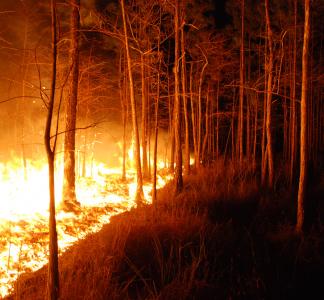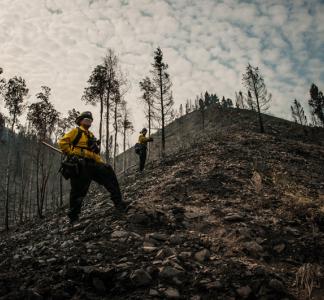Diverse leadership is critical in fight for clean air, against climate change

Wildfires, drought, and soaring temperatures have gripped the Western United States in the summer of 2020.
Pixabay
Jerry and Gabriel Otero are brothers who live in western Colorado, the grandsons of Colorado and Arizona miners. In this opinion piece, originally published in the Denver Post, they point to the unequal impact of climate change and explain that people of color must have a seat at the table if we're going to solve this pressing issue.
Colorado is seeing the impacts of climate change in real time. Wildfires, drought, and soaring temperatures have again gripped the state this summer. Over 295,000 acres have burned and I-70, a lifeline of commerce, saw its longest closure in recent memory. In our hometown of Grand Junction, air quality warnings have gone out and smoke and ash covered the valley as the Pine Gulch fire grew to the largest in the state’s history.
As grandsons of miners from Colorado and Arizona, we understand the value of utilizing our natural resources, and the dignity that a job that provides for your family can bring. Fair, equitable and clean energy policy does not mean taking from those opportunities, rather it is providing the same reverence for all communities impacted by energy development. Our conservation values come from our upbringing and our heritage, values from our parents and generations of Latino people who helped build and preserve these great lands. Now it’s our turn. Climate change and pollution from fossil fuel development are the paramount issues of our time. Carbon and other pollutants are harming our communities. We are committed to making a positive change and we demand action by those with power to enact change.
Climate change has an acute and disproportionate impact on people of color. A study by the National Academies of Sciences found that Black and Latino communities are exposed to far more air pollution than they produce, while white Americans experience better air quality, even though their activities are the source of more pollution. Colorado is not exempt from these realities, which is why we must collectively address the disparities to change the inequities that have endangered the health and future of our great state. Colorado has the 8th largest Latino population in the nation. We are predicted to comprise 46% of Colorado’s population in 2050, compared to 30% currently, according to the Bell Policy Center. Despite our demographic presence, people of color continue to strain our eyes to find ourselves in board rooms, government commissions, and in leadership positions that influence our energy policy decisions. Protesting outside a meeting and writing letters is no longer adequate.
People of color need a seat at the table

Climate change has an acute and disproportionate impact on people of color.
Mason Cummings, TWS
People of color need a seat at the table – every table – and we need our leaders to listen to our concerns. Embracing diversity is not about political correctness. It is the frank recognition that people of color have been, and continue to be left out of important conversations, not because they are not qualified participants, but because of systemic, direct and passive actions that removed their seats from the table. Our collective future should no longer accept a predominately Latino neighborhood in Denver as the ‘most polluted zip code’ in America. We should no longer accept the inequity laid bare by energy development siting issues connected to Bella Romero Academy where fracking exceeded eight-hour health standards for cancer-causing benzene 113 times during the monitoring period, including school days, according to Barrett Engineering. We will no longer accept the long list of health impacts many Latino communities face, including three times the risk of cancer due to air toxic emissions, and two times higher asthma rates nationwide, which can be connected to proximity to poor air quality, among others. There are many systemic tethers to these alarming realities, but one way we can start to fix these issues is inclusion, opportunity, and fair representation.
Our state and our nation are in desperate need of collaboration. Diversity in boardrooms and in government is a solid start, but that should just be the beginning. We demand that our representatives step up and work with our state’s diverse populations, to listen to us regarding the challenges and opportunities associated with climate change. Solutions abound. Recently, both the U.S. House Select Committee on the Climate Crisis and the U.S. Senate Special Committee on the Climate Crisis released robust reports outlining pathways for climate action that dramatically cut carbon pollution by moving rapidly toward a clean energy future. The plans would grow our economy, create millions of jobs and clean up our air and our communities.
But those solutions require actions by everyone. Our elected leaders must move past partisanship and enact the proper policies, our communities need to look past differences and find common ground, and as individuals, it’s our responsibility to do our part to combat climate change. Colorado’s future depends on it.
*Jerry Otero is the senior energy analyst for the National Parks Conservation Association and national co-chair of NPCA’s Justice Equity Diversity and Inclusion initiative. Gabriel Otero is the Colorado Plateau representative for the Wilderness Society.



